To avoid choosing the worst Toyota Prius years, we’ve ranked each model for the latest generations.
I will look at all Toyota Prius generations in this guide, including the best and worst years to buy a Prius.
In this in-depth analysis, I’ve compiled reliability scores, owner ratings, safety metrics, and more based on extensive research from credible sources like the NHTSA, VehicleHistory, and others.
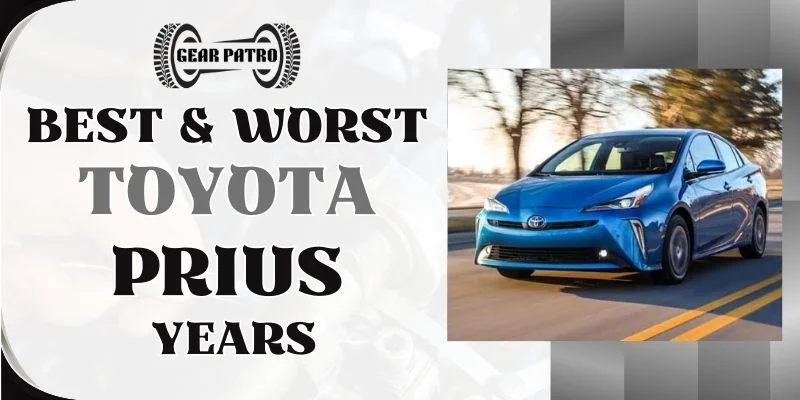
Discover the mechanics behind the Toyota Prius’ most popular years and the problems that plagued specific models. Find out how the Prius’s resale value has changed over time.
Come on, let’s get started!
Toyota Prius Generations
With its revolutionary design and technology, the Toyota Prius launched the hybrid movement in Japan in 1997 and worldwide in 2001.
A 1.5-liter gasoline engine coupled with an electric motor offered better fuel economy and reduced emissions than traditional gasoline-only vehicles in the first generation (WX10).
| Generation | Years |
|---|---|
| 1st generation (WX10) | 2001-2003 |
| 2nd generation (WX20) | 2004-2009 |
| 3rd generation (WX30) | 2010-2015 |
| 4th generation (WX50) | 2016-2022 |
| 5th generation (WX60) | 2023-Present |
This article examines how the Prius has evolved since 2001. There have been numerous changes and innovations over the years, so it is important to understand these generational differences when selecting the best Prius model year.
Toyota Prius Best, Neutral, and Worst Years
We consider various factors when ranking and categorizing the best and worst Toyota Prius years. Among them are:
On the basis of collective insights, I compiled a table categorizing each Toyota Prius model year as either the best, neutral, or worst.
| Generation | Best Years | Neutral Years | Worst Years |
| 1st generation (WX10) | 20022003 | N/A | 2001 |
| 2nd generation (WX20) | 2009 | 20042005 | 200620072008 |
| 3rd generation (WX30) | 201320142015 | 20112012 | 2010 |
| 4th generation (WX50) | 20182019202020212022 | N/A | 20162017 |
| 5th generation (WX60) | 20232024 | N/A | N/A |
A neutral year is one in which reliability, owner satisfaction, and other measured metrics did not greatly outperform nor underperform.
NHTSA recalls, for example, negatively impact our evaluations. There has been an increase in complaints and recalls, suggesting reduced reliability and potential owner dissatisfaction.
Here are the best, neutral, and worst years for Toyota Prius.
Best & Worst Years for Toyota Prius 1st Generation (2001-2003)
A hybrid vehicle with eco-friendliness, the Toyota Prius was introduced to the American market in 2001.
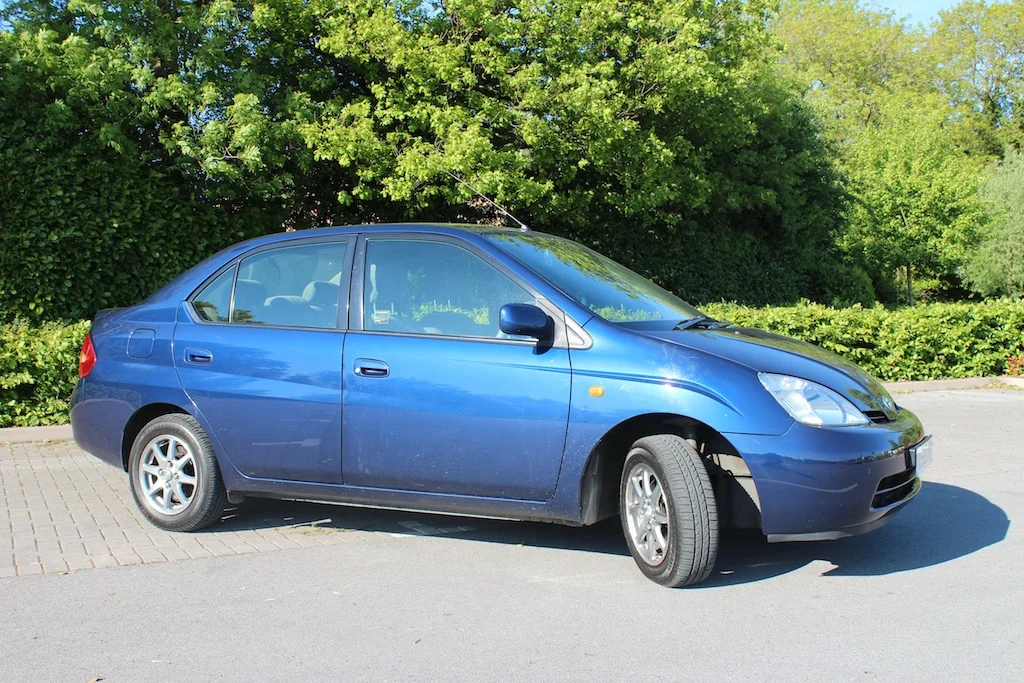
There are two best Toyota Prius years of the generation – 2002 and 2003 – and one year you should avoid – 2001.
The Best Years: 2002, 2003
Since 2002 and 2003 had relatively few owner-reported complaints, we rated them as the best Toyota Prius years.
Toyota’s Hybrid Synergy Drive models featured 1.5-liter gasoline engines and electric motors. It achieved an impressive average fuel economy of 41 mpg with this setup.
Continuously variable transmission (e-CVT) was employed as the transmission system.
As well as regenerative braking, the Prius of these years offered short-distance EV mode.
There were, however, flaws in them as well. There have been some reports of minor glitches in electronic components from some owners. However, the 2002 and 2003 models stood out in terms of reliability and performance compared to their predecessors.
The Worst Years: 2001
Power steering assist issues lead to concerns about maneuverability, according to owners.
A dashboard malfunction was one of the most common complaints regarding electrical problems.
There was also an abnormal pattern of wear on the tires of this particular model.
In 2001, there were two significant recalls – a power steering assist loss recall and a crankshaft position sensor malfunction recall.
As far as resale value is concerned, the 2001, 2002, and 2003 Prius models have similar values. As a result, you should purchase a 2002 or 2003 Prius rather than a 2001.
NHTSA recalls and complaints for the 2001 Toyota Prius.
Best & Worst Years for Toyota Prius 2nd Generation (2004-2009)
In the second generation of the Prius, Toyota furthered its exploration of hybrid technology. With its more refined features, larger size, and enhanced performance capabilities, the Prius began to capture the hearts of eco-conscious drivers worldwide.
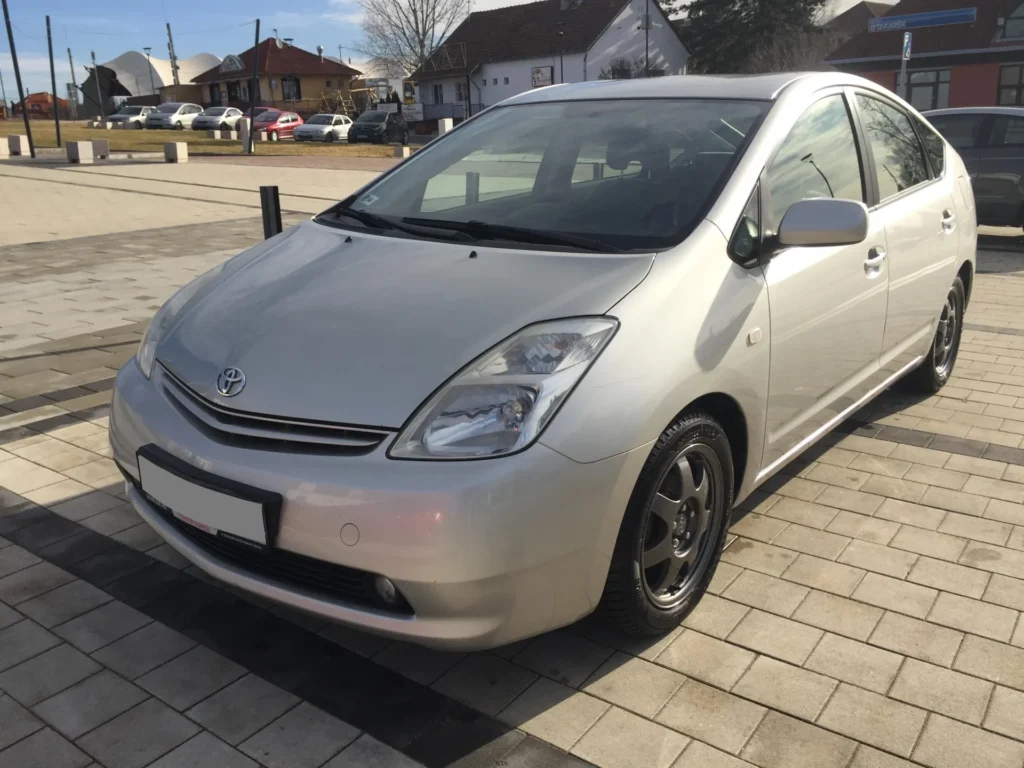
Toyota Prius models from 2006-2008 are the least desirable in the second generation, while 2009 is the best year.
The Best Years: 2009
Based on owner-reported complaints and recalls, 2009 is the only Prius year you can buy in this generation.
In 2009, the Toyota Prius featured a 1.5-liter gasoline engine and an electric motor, offering 46 mpg of fuel economy.
With e-CVT, the powertrain combination was expertly combined.
There was also lane-keeping assist, radar cruise control, and a parking assistant included in the vehicle.
Even though the 2009 Prius excelled in several areas, there were still reports of headlight failures and brake issues, but owners’ positive feedback far outweighed these.
The Neutral Years: 2004, 2005
As the Prius entered its transition phase between 2004 and 2005, it incorporated advancements while still needing refinement.
The 1.5-liter gasoline engine and e-CVT system were shared across both models, resulting in a respectable fuel economy around 46 miles per gallon.
A Smart Key System, a multi-function display, and Bluetooth capabilities were introduced by Toyota.
There were, however, a few areas of concern. A sticky gear selector and issues with the inverter/converter coolant pump have occasionally been reported by owners.
Even with these hitches, the cars were generally well received, helping the Prius reach its full potential.
The Worst Years: 2006, 2007, 2008
It’s best to avoid Toyota Prius years 2006, 2007 and 2008, which have over 1000 owner complaints on NHTSA.
There were persisting problems, such as headlight failures, and emerging problems, such as door latch failures and instrument cluster panel malfunctions.
A number of recalls occurred during this period related to water pump failures, steering shaft problems, and sticky accelerator pedals.
In addition, the 2008 Toyota Prius suffered brake failures that added to the list of concerns.
Best & Worst Years for Toyota Prius 3rd Generation (2010-2015)
During its 3rd generation, the Toyota Prius received significant design upgrades and technical advancements, establishing the model as the quintessential hybrid vehicle.
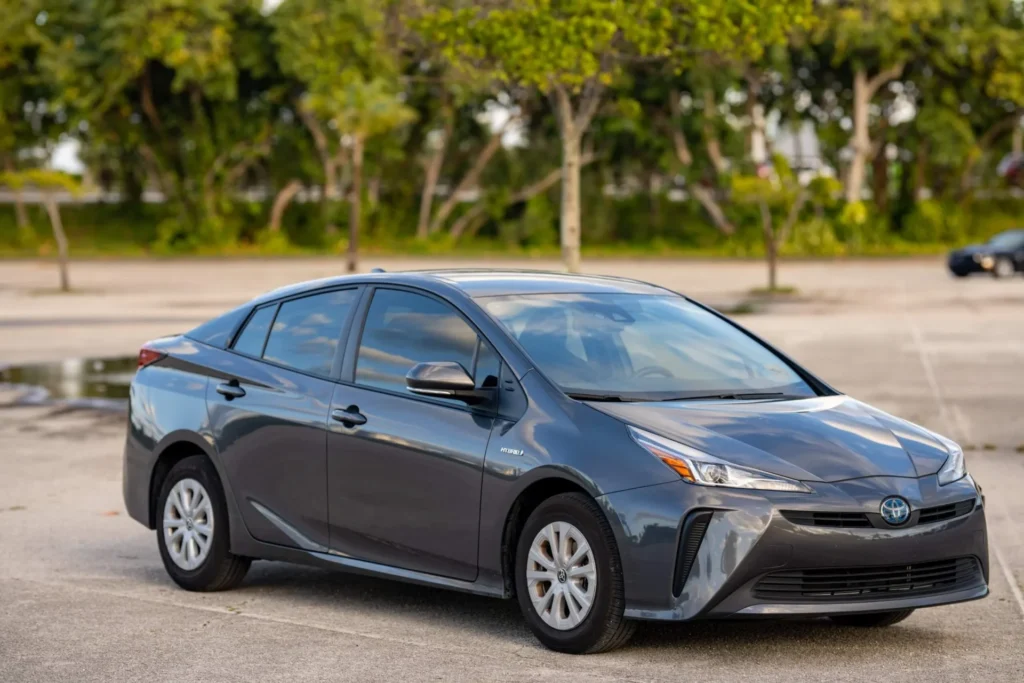
Toyota Prius model year 2010 is the most problematic of the generation, and you should avoid it. The best and most reliable Priuses of the third generation were released in 2013, 2014, and especially in 2015.
The Best Years: 2013, 2014, 2015
Which year is best for owning a Prius? 2013 and 2014 are undeniably the best Toyota Prius years for third-generation models, with far fewer complaints and recalls reported to NHTSA as well as standout reliability and owner satisfaction ratings from Consumer Reports.
Powered by a 1.8-liter Atkinson cycle gasoline engine and Toyota’s Hybrid Synergy Drive, these models delivered an impressive 48 mpg.
There were a number of advanced safety features introduced by Toyota during these years, such as pre-collision systems, adaptive cruise control, and lane departure warnings.
There were several trim options to choose from, including enhanced infotainment systems, wireless charging, and solar roofs.
Although there were minor complaints during these years, such as infotainment glitches, the overall experience was positive, with fewer maintenance needs and higher reliability ratings.
The Neutral Years: 2011, 2012
Despite using the same 1.8-liter engine and Hybrid Synergy Drive, the 2011 and 2012 Prius models maintained commendable fuel economy.
Toyota’s Entune multimedia interface was introduced during these years as well as enhanced entertainment systems.
There were, however, challenges along the way. Brake concerns were the most prevalent issues.
In spite of these setbacks, the cars received largely favorable reviews on platforms such as J.D. Power, demonstrating Toyota’s commitment to continuous improvement.
The Worst Years: 2010
We conclude that 2010 is the worst Toyota Prius year with over 2000 owner complaints and numerous recalls.
Two recalls were issued by Toyota due to brake issues, including one for nitrogen contamination in brake fluid and the other for a malfunctioning ABS electronic control unit.
The year’s reputation was further damaged by excessive oil consumption reports.
It became a symbol of the teething issues often associated with pioneering automotive evolutions because the 2010 Toyota Prius laid the foundation for the subsequent improvements in the 3rd generation.
Best & Worst Years for Toyota Prius 4th Generation (2016-2022)
In the 4th generation of the Toyota Prius, the hybrid market was once again redefined. The Prius was designed to be fuel-efficient and enjoyable to drive with a complete overhaul, a lighter structure, and improved aerodynamics.
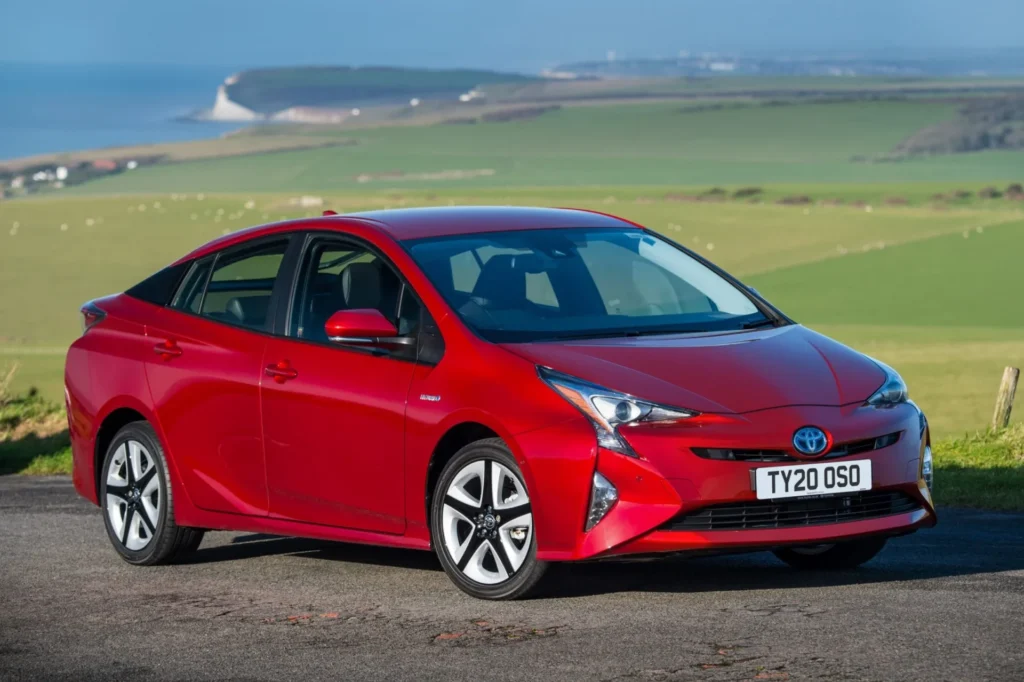
This generation’s best and most reliable Prius years are between 2018 and 2022. It is advised to avoid Toyota Prius years 2016 and 2017 due to several necessary recalls.
The Best Years: 2018, 2019, 2020, 2021, 2022
This generation of Toyota Prius thrived from 2018 onward, resolving most of the issues that plagued the earlier models.
Power came from a 1.8-liter 4ZR-FXE engine paired with an electric motor, which produced 121 horsepower.
Prius consistently achieved fuel economy above 52 mpg thanks to this setup.
Toyota introduced advanced technology and safety features, including adaptive cruise control, automatic high beams, and pedestrian detection in its Safety Sense P suite.
2019 brought a notable enhancement to the all-wheel-drive system, appealing to those in colder climates.
These were the peak years of Prius innovation and reliability, with features such as an 11.6-inch touchscreen, head-up display, and premium JBL sound system.
The Worst Years: 2016, 2017
In the fourth generation of the Toyota Prius, what should we avoid? Due to brake failures, I would not recommend 2016 or 2017.
Excessive oil consumption, cracks in the windshield, and peeling paint were among the complaints associated with the models.
It was recalled due to concerns such as an engine wire harness short circuit, which posed a fire hazard, and disengagement of the parking brake cable.
Even though these initial hiccups were concerning, they served Toyota well.
As a result, the Prius lived up to its reputation as a benchmark in the world of hybrids by collecting feedback and meticulously improving subsequent models.
Best Years for Toyota Prius 5th Generation (2023-Present)
This is the most advanced iteration of Toyota’s iconic hybrid since the 5th generation began in 2023.
Toyota made every effort to ensure that this generation of eco-friendly vehicles was both technologically superior and environmentally friendly.
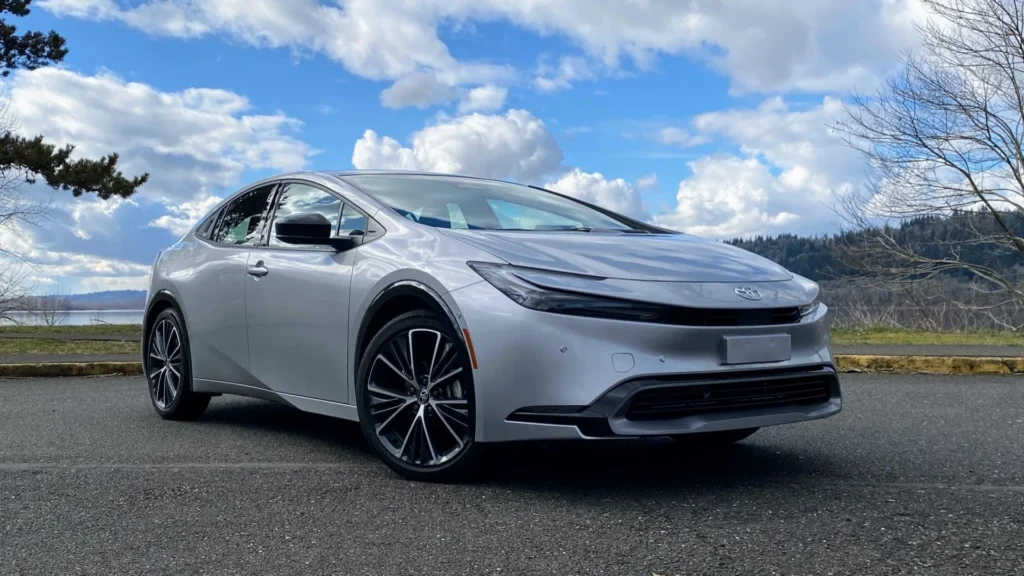
The Best Years: 2023, 2024
Toyota’s Prius models for 2023 and 2024 represent the pinnacle of hybrid technology.
An electric motor is seamlessly paired with a powerful 2-liter four-cylinder engine in these versions.
As a result of the combined output, the vehicle delivers an agile performance without compromising fuel efficiency, which is claimed to be around 57 mpg combined.
Toyota has innovated technologically with features such as a solar-powered roof that aids in battery charging, extending the range of the vehicle.
With Toyota’s Safety Sense 3.0 suite, like Road Sign Assist and Lane Tracing Assist, safety has been enhanced.
Prius’s status as the pinnacle of hybrid vehicles in this generation has been further cemented by the new trim levels that feature a more luxurious interior, ambient lighting, and a state-of-the-art infotainment system.
Common Toyota Prius Problems
RepairPal rates the Prius’ reliability at 4.0 out of 5.0, ranking it 10th out of 24 midsize cars. There are a couple of common problems with the Prius despite its above-average reliability:
Best & Worst Toyota Camry Years | Years To Avoid
Best & Worst Toyota RAV4 Years (Years To Avoid)
Best & Worst Toyota Highlander Years | Years To Avoid
Best & Worst Toyota Tacoma Years | Years To Avoid
Best & Worst Toyota Tundra Years | Years To Avoid
Best & Worst Toyota 4Runner Years | Years To Avoid
Best & Worst Toyota Corolla Years | Years To Avoid
Best & Worst Toyota Sienna Years | Years To Avoid
Best & Worst Toyota Avalon Years | Years To Avoid
FAQs: Used Toyota Prius Years to Avoid
What years of Prius should you stay away from?
The 2005, 2006, 2007, 2008, 2009, 2010, 2011, 2012, and 2016 Toyota Prius models are not recommended for potential buyers. Several issues have been reported with these models, including malfunctioning headlights and excessive oil consumption.
What are the safest Prius years?
For the Toyota Prius, the early models (2000-2004) and the more recent models from 2013 to 2020 have the fewest reported issues and the best reliability ratings. When looking for a used Toyota Prius, these models are considered the best options.
Is the Prius the most reliable hybrid vehicle?
As one of the most reliable hybrid vehicles, the Toyota Prius is renowned for its dependability. There are, however, some years that are less reliable than others, as with any vehicle. It’s important to know which model years to avoid when purchasing a new or used Toyota Prius.
How does the Prius compare to other hybrid vehicles regarding maintenance costs?
Generally, Toyota Prius’ maintenance costs are lower than those of other hybrid vehicles due to Toyota’s expertise in hybrid technology. Due to their known issues, certain years may incur higher costs, particularly those we recommended avoiding.
Are there any advantages to buying a new Prius over a used one?
With a new Prius, you’ll have access to the latest technology, a full warranty coverage, and the peace of mind that comes with no previous wear and tear. You can, however, find excellent value in a used Toyota Prius, especially if you choose a well-maintained model from one of the best Toyota model years.
Conclusion
Based on performance and reliability, the 2013-2015 and 2018-2024 Toyota Prius models stand out as the best. In contrast, the Toyota Prius years 2006-2008 and 2010 should be avoided.
The best Prius model year is the one that balances function and aesthetics the best?
Comment below and let us know what you think!
